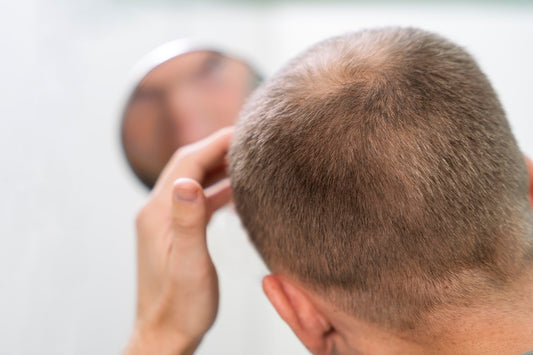Nourishing hair doesn't merely end at finding the right shampoo or conditioner; real hair care extends beyond the surface. By establishing a sustainable hair care routine and feeding our bodies with the right nutrients, we ensure that we start caring for our hair from within. Let's enrich our understanding of creating a sustainable hair care routine.
Consider your hair as a reflection of your overall health. The condition can signal if you're eating right, if you're stressed, and even whether you may potentially have chronic illnesses. Hence, nourishing your hair from within fundamentally begins with in-depth attention to your wellness.
Understanding Hair Health
When we speak of hair health, it's typical to paint a picture of glossy, lustrous locks that turn heads. However, the real essence of healthy hair is its strength.
The resilience of strong hair enables it to resist physical stressors, endure chemical treatments, and stand robust against adverse weather conditions.

The strength of hair is characterized by its resistance to breakage, coupled with its radiant shine and softness - these elements collectively signify the real hallmark of a healthy mane.
Let's delve into the specific factors that influence hair health:
- Genetics: The inherited traits from our ancestors play a fundamental role in determining the health, density, color, and texture of our hair.
- Nutritional Deficiencies: Nutrients like protein, iron, Vitamin D, and Biotin are essential for hair growth and health. A deficiency in any of these can lead to hair loss and brittleness.
- Age: As we age, our hair naturally loses its density and strength, sometimes changing texture and color. This is a normal part of the aging process.
- Hormones: Hormonal changes can significantly impact hair health. For instance, pregnancy often leads to thicker hair, while menopause may cause thinning.
- Stress: Chronic stress can trigger hair loss as the body reroutes nutrients and energy away from non-vital processes like hair growth to support essential bodily functions.
- Environmental Factors: Exposure to pollutants, UV radiation, chlorine in swimming pools, and harsh weather conditions can all take a toll on the health of our hair, causing it to become dry and brittle.
Attending to these factors and understanding their role in hair health can help us adopt a holistic and effective approach to hair care.
Identifying Your Hair Type
A tactical approach to developing a successful hair care routine begins by identifying your unique hair type. Whether you have oily, dry, or combination hair, each has inherent characteristics that require specialized care. Let's explore this in more detail:
1. Oily Hair
Oily hair typically becomes greasy within a day or two after washing. This excess oil production is an outcome of overactive sebaceous glands on the scalp.
The strategy for managing oily hair involves using a clarifying shampoo specifically designed to effectively remove excessive oil, followed by a lightweight conditioner to retain essential moisture. Also, regular scalp massages can stimulate circulation and help reduce oil production.
2. Dry Hair
Dry hair often appears lackluster, displays split ends, and exudes a coarse touch. This condition can originate from several causes, including genetics, over washing, harsh hair products, heat styling, or environmental damage.

A powerful approach to reviving dry hair is reliant on integrating hydrating shampoos and deep-conditioning masks into your regimen.
These are enriched with moisture-enhancing ingredients that deeply penetrate the hair’s outermost layer for substantial nourishment. Regular hot oil treatments can also fortify moisture in the hair.
3. Combination Hair (oily roots and dry ends)
Combination hair presents a distinctive challenge of managing an oily scalp while also catering to dry ends. The balancing act here lies in employing a shampoo and conditioner formulated to simultaneously control oil production and intensively moisturize dry ends.
A key tip for managing combination hair is to apply conditioner mainly to the hair ends to provide much-needed hydration without exacerbating scalp oiliness. Also, using a dry shampoo between washes can help manage oiliness at the roots.
4. Normal Hair
This type is the golden middle, characterized by balanced sebum production, minimum split ends, and a healthy shine. If you're among the lucky ones with normal hair, stick to a balanced hair care routine. Opt for a gentle shampoo and conditioner and make a habit to occasionally treat your hair with a nourishing mask or oil.
Your hair type is key to devising an effective hair care strategy tailored to your needs and challenges. With the appropriate care, every hair type can exhibit health and radiance.
Creating a Sustainable Hair Care Routine
Implementing a sustainable hair care routine is pivotal to maintain hair health, strength, and shine.

This incorporates various steps, and while they might differ slightly depending on individual hair types, the core principles remain the same:
- Consistent Washing Schedule: The frequency of washing your hair depends on your hair type, physical activity levels, environment, and personal preferences. As a standard guideline, it's suggested to wash your hair every 2-3 days. However, those with dry or chemically treated hair might choose to extend this, while those with oily hair might need to wash more frequently. Remember, over-washing can strip your hair of its natural oils, leading to dryness and increased damage.
- Conditioning After Every Wash: Conditioning is a crucial step that follows each wash. Conditioner serves to replenish the hair's moisture after being stripped away by shampoo, enhancing the hair with essential oils. It also smooths out the hair cuticles, promoting detangling and adding shine and softness.
- Weekly Deep Conditioning Treatments: Deep conditioning with hair masks on a weekly basis provides extensive hydration, aiding in hair repair, minimizing breakage and promoting healthy growth. These treatments penetrate deep into the hair shaft, providing nourishment and strengthening the hair from within.
- Regular Trimming: Regular trims, every 6-8 weeks, help to maintain healthy ends and ward off split ends. This not only keeps your hair looking neat, but it also prevents further breakage and aids in maintaining the overall hair health.
- Limitation of Heat Styling: Heat styling tools, while useful for creating various hairstyles, can cause considerable damage to the hair protein, leading to breakage, dryness, and dullness. It’s important to limit the use of such tools and always use a heat protectant spray when styling.
- Protection from Sun Exposure: Just like your skin, your hair also needs protection from excessive sun exposure. UV radiation can cause the hair to dry out and become brittle, leading to breakage. Wearing hats or using hair products with UV protection can help protect your hair.
Building a sustainable hair care routine that works for you will lead to longer, stronger, and healthier hair over time.
Eating Right for Hair Health
The saying "you are what you eat" undoubtedly rings true when considering hair health. The vitality, growth, and lustre of your hair are profoundly impacted by the nutritional value of your diet.

A balanced intake of proteins, vitamins, and minerals sets the foundation for healthy hair:
- Protein: Hair is essentially composed of a protein called keratin. As such, maintaining a protein-rich diet can contribute positively to hair health and reinforcement. For a direct, high-quality protein source, consider including lean meats, fish, poultry, and eggs in your diet. For vegetarians and vegans, tofu, tempeh, lentils, and chickpeas serve as excellent protein-rich alternatives.
- Iron: Iron is a key mineral essential for hair growth and preventing hair loss. An iron deficiency can interrupt the nutrient supply to the follicle, affecting the hair growth cycle and may result in shedding. Iron-rich foods include red meat, spinach, oysters, lentils, and fortified grains.
- Vitamin D: Vitamin D plays a critical role in stimulating hair follicles and promoting hair growth. It's often referred to as the 'sunshine vitamin' as your body can produce it through direct exposure to sunlight. However, other sources include fatty fish (such as salmon and mackerel), fortified milk and dairy products, and, for vegans, mushroom and fortified soy milk.
- Biotin: Also known as Vitamin B7, biotin aids in hair growth and contributes to its strength and thickness. Deficiency in biotin can lead to thinning of hair. Good sources of biotin include egg yolks, yeast, liver, whole grains, bananas, and nuts.
Adding on to that, incorporate the following nutrients for a comprehensive approach to your hair health:
- Vitamin A: All cells need vitamin A for growth, including hair, which is the fastest growing tissue in the human body. Vitamin A-rich food includes sweet potatoes, carrots, pumpkins, spinach, and kale.
- Vitamin E: Similar to vitamin C, vitamin E is an antioxidant that can prevent oxidative stress. Sunflower seeds, almonds, spinach, and avocados are all high in vitamin E.
- Omega-3 Fatty Acids: Omega-3 fats are healthy fats that your body can’t make itself and must be obtained through your diet. Foods high in Omega-3 include fatty fish, flaxseeds, chia seeds, walnuts, and soybeans.
By integrating a variety of these nutrient-rich foods into your daily diet, you can promote healthier and more resilient hair.
Conclusion
Taking care of your hair starts from the inside out. By eating healthful foods and committing to a consistent routine, your hair won't just look great - it'll also feel strong and robust.
Just like any good thing in life, maintaining healthy hair needs ongoing commitment. The actions you take today to nurture your hair can lead to stronger, healthier hair down the line.
Looking for a straightforward way to maintain thick, luscious, and robust hair? Try the Mohebi Life Natural Hair Support Supplement for Men. Just one pill a day can let you experience the notable benefits of our carefully crafted formula.
Our supplement combines the purest natural ingredients like saw palmetto and pumpkin seed oil, backed by the latest scientific research. Our aim is to support plentiful hair growth and improve your hair's natural health. Let Mohebi Life start you on your adventure towards all-around hair wellness.
FAQs
What is the importance of a haircare routine?
A haircare routine is crucial to maintaining the health, strength, and luster of your hair. By consistently caring for your hair, you can prevent damage, breakage, and dryness while promoting healthy growth and shine.
How do I make my own hair care routine?
Start by identifying your hair type—whether it's oily, dry, or a combination. Opt for products suited for your hair, establish a consistent washing and conditioning schedule, incorporate weekly deep conditioning treatments, trim your hair regularly, and protect it from the sun and heat styling.
How can I nourish my hair daily?
You can nourish your hair daily by maintaining a healthy diet rich in proteins, iron, Vitamin D, and vitamins like Biotin. Additionally, a daily application of hair oils and leave-in conditioners can also help nourish your hair.
How can I make my hair more nourishing?
To make your hair more nourishing, focus on your diet, ensuring you take in enough proteins, vitamins, and essential oils. Additionally, aim to incorporate deep conditioning treatments into your routine, and opt for gentle, sulfate-free shampoos and conditioners comprised of nourishing ingredients.



